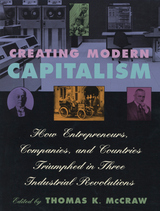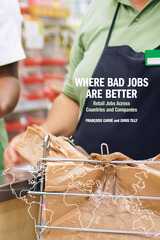3 books about Companies

Cotton
Companies, Fashion and the Fabric of Our Lives
Edited by Joseph H. II Hancock, Nioka Wyatt, and Tasha L. Lewis
Intellect Books, 2016
This book brings together contributors from a wide range of disciplines to explore the importance of cotton as a major resource for US fashion businesses. It is rooted in a lengthy investigative research project that deployed undergraduate and graduate students and faculty researchers to US fashion businesses that rely on cotton to make their garments—with the goal of better understanding how such a key resource is sourced, priced, transported, manipulated, and, ultimately, sold on to the consumer as a stylish garment. The contributors focus in particular on the role of brands in the marketing of cotton goods, and the way that brand marketing creates distinctions, valuable in the marketplace, between various versions of what are at base similar items of clothing, like t-shirts and underclothes. The book also explores the importance of the “Made in the USA” campaign, with its appeal to consumers concerned about local manufacturing employment, reduced resource use, and social responsibility.
[more]

Creating Modern Capitalism
How Entrepreneurs, Companies, and Countries Triumphed in Three Industrial Revolutions
Thomas K. McCraw
Harvard University Press, 1997
What explains the national economic success of the United States, Britain, Germany, and Japan? What can be learned from the long-term championship performances of leading business firms in each country? How important were specific innovations by individual entrepreneurs? And in the end, what is the true nature of capitalist development?The Pulitzer Prize–winning historian Thomas K. McCraw and his coauthors present penetrating answers to these questions. Creating Modern Capitalism is the first book to explain for a broad audience the interconnections among technological innovation, management science, the power of entrepreneurship, and national economic growth. The authors approach each question from a comparative framework and with a unique triple focus on national economic systems, particular companies, and individual business leaders.Above all, the book focuses on how specific entrepreneurs influenced the economic success of their countries: Josiah Wedgwood and Henry Royce in Britain; August Thyssen and Georg von Siemens in Germany; Henry Ford, Alfred Sloan, and the two Thomas J. Watsons in the United States; Sakichi Toyoda, Masatoshi Ito, and Toshifumi Suzuki in Japan.The product of a three-year collaborative effort at the Harvard Business School, the book combines cutting-edge scholarship with a finely tuned sense of the art of management. It will engage general readers as well as those with a special interest in entrepreneurship and the evolution of national business systems.
[more]

Where Bad Jobs Are Better
Retail Jobs Across Countries and Companies
Francoise Carre
Russell Sage Foundation, 2017
Retail is now the largest employer in the United States. For the most part, retail jobs are “bad jobs” characterized by low wages, unpredictable work schedules, and few opportunities for advancement. However, labor experts Françoise Carré and Chris Tilly show that these conditions are not inevitable. In Where Bad Jobs Are Better, they investigate retail work across different industries and seven countries to demonstrate that better retail jobs are not just possible, but already exist. By carefully analyzing the factors that lead to more desirable retail jobs, Where Bad Jobs Are Better charts a path to improving job quality for all low-wage jobs.
In surveying retail work across the United States, Carré and Tilly find that the majority of retail workers receive low pay and nearly half work part-time, which contributes to high turnover and low productivity. Jobs staffed predominantly by women, such as grocery store cashiers, pay even less than retail jobs in male-dominated fields, such as consumer electronics. Yet, when comparing these jobs to similar positions in Western Europe, Carré and Tilly find surprising differences. In France, though supermarket cashiers perform essentially the same work as cashiers in the United States, they receive higher pay, are mostly full-time, and experience lower turnover and higher productivity. And unlike the United States, where many retail employees are subject to unpredictable schedules, in Germany, retailers are required by law to provide their employees notice of work schedules six months in advance.
The authors show that disparities in job quality are largely the result of differing social norms and national institutions. For instance, weak labor regulations and the decline of unions in the United States have enabled retailers to cut labor costs aggressively in ways that depress wages and discourage full-time work. On the other hand, higher minimum wages, greater government regulation of work schedules, and stronger collective bargaining through unions and works councils have improved the quality of retail jobs in Europe.
As retail and service work continue to expand, American employers and policymakers will have to decide the extent to which these jobs will be good or bad. Where Bad Jobs Are Better shows how stronger rules and regulations can improve the lives of retail workers and boost the quality of low-wage jobs across the board.
In surveying retail work across the United States, Carré and Tilly find that the majority of retail workers receive low pay and nearly half work part-time, which contributes to high turnover and low productivity. Jobs staffed predominantly by women, such as grocery store cashiers, pay even less than retail jobs in male-dominated fields, such as consumer electronics. Yet, when comparing these jobs to similar positions in Western Europe, Carré and Tilly find surprising differences. In France, though supermarket cashiers perform essentially the same work as cashiers in the United States, they receive higher pay, are mostly full-time, and experience lower turnover and higher productivity. And unlike the United States, where many retail employees are subject to unpredictable schedules, in Germany, retailers are required by law to provide their employees notice of work schedules six months in advance.
The authors show that disparities in job quality are largely the result of differing social norms and national institutions. For instance, weak labor regulations and the decline of unions in the United States have enabled retailers to cut labor costs aggressively in ways that depress wages and discourage full-time work. On the other hand, higher minimum wages, greater government regulation of work schedules, and stronger collective bargaining through unions and works councils have improved the quality of retail jobs in Europe.
As retail and service work continue to expand, American employers and policymakers will have to decide the extent to which these jobs will be good or bad. Where Bad Jobs Are Better shows how stronger rules and regulations can improve the lives of retail workers and boost the quality of low-wage jobs across the board.
[more]
READERS
Browse our collection.
PUBLISHERS
See BiblioVault's publisher services.
STUDENT SERVICES
Files for college accessibility offices.
UChicago Accessibility Resources
home | accessibility | search | about | contact us
BiblioVault ® 2001 - 2024
The University of Chicago Press









